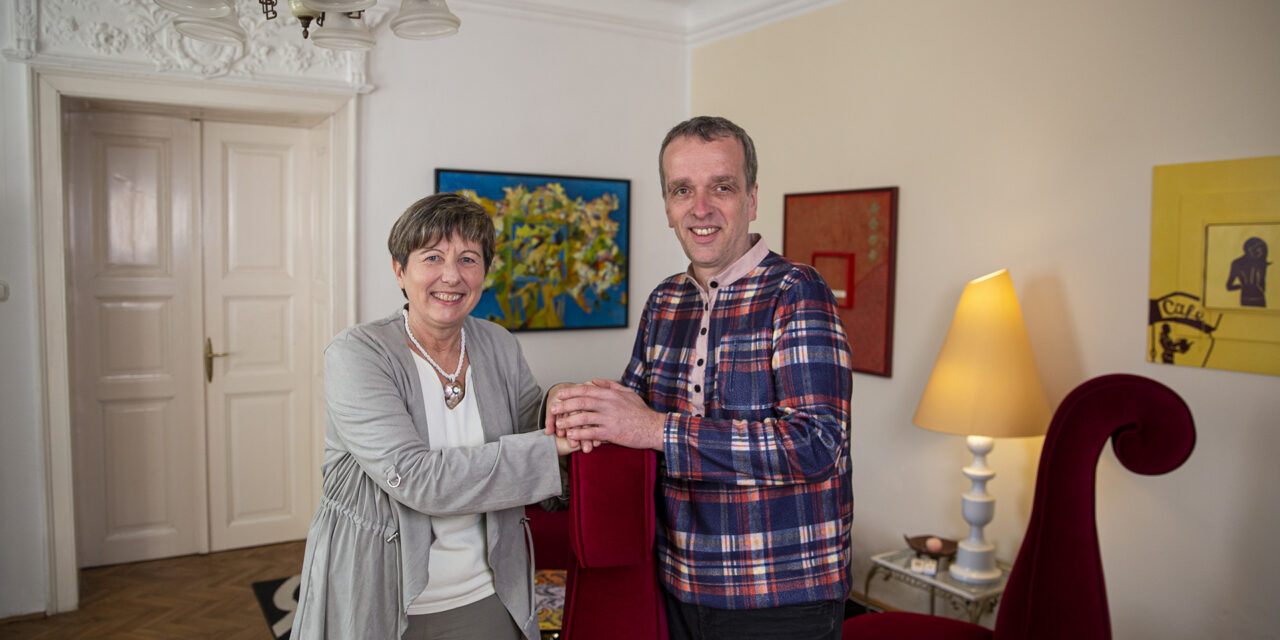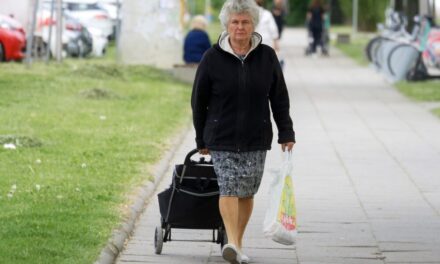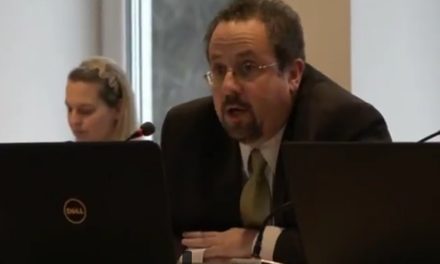Why are more and more people moving from Germany to Hungary? We can learn from a German couple living in Somogyvár what changes caused them to leave their country. How do those who come to us see Hungary and the Hungarian people? – this is clear from the interview.
Emily Paersch has been living in Somogyvár with her husband Andreas and her mother since 2020. They also operate their marketing consulting business from a settlement close to Lake Balaton, whose partners are mainly companies operating in German-speaking areas. They are also a family that left their country due to the social and economic processes in Germany and found a new home in Hungary. The conversation took place in their home in Somogyvár.
What do you think have been the most important developments in Germany in recent years?
Emily Paersch: I feel like the country has gone through dramatic changes in many ways in the last 20 years. From a political, economic and social point of view. If we look at economic aspects, the controversial energy policy is currently the most prominent. After all, Germany's economic model has so far depended on industry, which accounts for 30 percent of economic performance, and with the current questionable energy policy, this sector is being destroyed. In this regard, the sanctions policy supported by Germany, which results in the constant increase in the price of energy, can be questioned. This not only burdens the economy, but also residential consumers.
In Germany, we have now reached the point where many simply do not have enough money for everyday life.
Andreas Paersch: We hear about store closures every day. Whether they are bakeries or butcher shops. These are really small family businesses that have been practicing their craft for years and decades, and now they can no longer afford to continue production.
Emily: Another important factor is Germany's migration policy. The provinces are less and less able to bear the resulting burdens. In other words, financially, the situation can no longer be resolved, and there is no longer a place where the refugees could be accommodated. From all this, we draw the conclusion that German politics has gone astray in many places, which makes the lives of ordinary people very difficult.
These decisions seem incomprehensible to Hungarians. How do you see Germany's sovereignty within the EU and globally?
Emily: That's a tough question. Rule of law experts should clarify whether Germany is really a sovereign state in terms of the country's legal status. What we feel in relation to politics is that Germany follows the provisions of the EU, and in relation to the situation in Ukraine, it primarily complies with the dictates of the USA.
From the perspective of Hungary, it seems that these problems do not reach the German people. What about the German media?
Emily: That matches our experience as well. News reporting in Germany strictly follows government guidelines – or so we see. This means that diversity in opinion formation is not really a given, despite the fact that Germany likes to emphasize the importance of freedom of opinion.
Many times it seems that Germany is still ashamed of the Second World War. Could you talk about the current German national self-awareness in the light of current events?
Emily: This is a really sensitive topic in Germany. I grew up in post-war Germany, but throughout my life both politics and the media, as well as educational institutions, constantly reminded me of Germany's historical guilt. And this leaves traces in people. A healthy national consciousness simply cannot develop in Germany. Just to give an example:
when we moved to Hungary, we noticed how often the Hungarian flag was raised. Regardless of the holiday, the Hungarian flag is flying on every street. This would be unthinkable in Germany.
Andreas: Another good example is soccer. Today, the national team is only called "the team", while many years ago it was called the "national team". But this can no longer be said in Germany.
Emily: One feels that the German identity is being pushed more and more into the background.
How has this German identity crisis affected the way the country handles migration issues?
Emily: Basically, we are open to foreign cultures. We are also very curious, as we can get rich through them. The situation becomes critical when certain ethnic groups, who live according to different values and are not really open to integration, reach a critical mass.
Andreas: We also came to Hungary - we are happy to be here, to live here, but we remind ourselves every day that we are guests in this country. We also made sure to get to know how the Hungarians live, how the country lives, and we respect that. If we compare the German situation with this, one gets the feeling that in Germany the immigrant is in the foreground, and German values are relegated to the background.
Emily: An example from Berlin is that, on the instructions of the Federal Minister of Culture, an inscription, a biblical quote, had to be covered up on the wall of a rebuilt castle. Actually, they want to suppress the country's Christian orientation. At the same time, in Cologne, the Muslim community was allowed to have a muezzin call to prayer through loudspeakers. We can find many more examples in everyday life.
In kindergartens, for example, in more and more places, dishes made from pork are removed from the menu, because of course Muslim children cannot eat it.
How has everyday life changed as a result of migration? We hear more and more about violent attacks, about the fact that in some places it is no longer recommended to walk at night.
Emily: That's exactly what I experienced. My personal sense of security was no longer very good. I avoided walking the streets alone in the evenings.
Andreas: This also happened at our former residence in Bad Kreuznach in the city park. The municipality called on the population not to walk in the park after a certain time, because it is the territory of various foreign clans.
Emily: The official justification was drug trafficking, meaning that there was illegal drug trafficking in the city park, and in order to stop it, the entire population was banned from using the park after 8:00 p.m.
Andreas: We know families whose children were the only German children in their classes.
Emily: Since Germany's borders are still open and most migrants choose Germany as their destination - which is understandable, since social benefits are the highest there - the trend remains unchanged. This not only results in a social break, but also an economic one, since the majority of migrants arriving in Germany depend on social assistance.
How do you see the future of Germany in light of the current processes, the energy crisis, mass migration?
Emily: To dark. Very dark. You can't see the light at the end of the tunnel. The political attitude remains unchanged. And all of this was intensified, since they were not necessarily interested in a diplomatic solution in connection with Ukraine either.
Andreas: The feeling of fear and uncertainty is growing. People are no longer happy with the situation. This current wave of emigration from Germany is not accidental. And I really have to say that it is already a wave. Young and old, families and singles, poor and affluent alike are saying that they have to do something about their future because it can't go on like this.
Why did they choose Hungary as their new home?
Emily: At first, the country was not even among our possible target countries. We actually paid attention to Hungary when we read a newspaper article in which Prime Minister Orbán literally invited us.
We looked around the country, and it's no coincidence that we ended up right here at Lake Balaton, as many things here remind us of our home. Viticulture and water. As my husband said, we are currently experiencing a large wave of emigration from Germany to Hungary.
Many Germans experience a similar fate and come partly for economic and partly political reasons. In Hungary, everything is much more open, communication is much more fearless. In Germany, people have to be careful with their words, here we can really talk openly about our problems and troubles.
How do they see Hungary, what do they think of the Hungarian people?
Emily: We're impressed. The people are so friendly and helpful. What is also striking is how respectful people treat each other. This has changed a lot in Germany, people are much more aggressive with each other than before, while here they are usually very friendly and polite.
Andreas: Another important keyword is respect for people;
when I walk down the street, they greet me with kisses - because by now I'm not even the youngest. People notice and appreciate each other.
Although their number is decreasing, some Hungarians still have a minority complex vis-à-vis Western Europe. They still want to impose the slavish following of the West and the "dare to be small" mentality on us. How do you think we Hungarians define ourselves compared to the West?
Emily: I am surprised to hear that Hungary struggles with minority complexes. For me, Hungary is the only country within the European Union that still fights for Christian values and contradicts the dictates of the EU. So I have an extremely positive assessment of Hungary, even if I am obviously aware that the fence is not made of sausages in Hungary either.
But I am very happy and grateful that this defiance, this bastion of defense still exists within Europe, and that we can live here. In my opinion, Hungary has every reason to be proud.
Andreas: We also hear that the Hungarians are worried about the country and see the country's future in part gloomy, but if we look at the overall picture, we see that the borders are very secure, there are continuous announcements of new economic investments, and these are the best signs, which are possible. Of course, a lot still needs to be done in terms of wage levels and social benefits, but the direction is good and it seems that the country is developing in a positive direction. So I also think that Hungary does not need to hide and feel small. On the contrary!
Emily and Andreas Paersch in their home in Somogyvár / Photo: Gyula Péter Horváth













